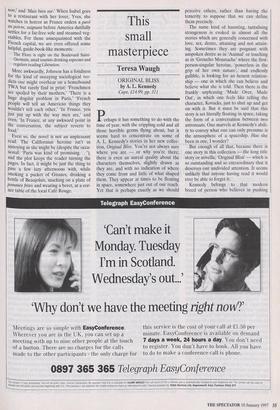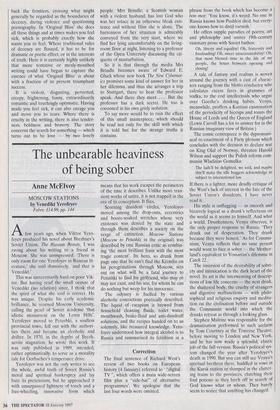This small masterpiece
Teresa Waugh
ORIGINAL BLISS by A. L. Kennedy Cape, £14.99, pp. 311 Perhaps it has something to do with the time of year, with the crippling cold and all those horrible germs flying about, but it seems hard to concentrate on some of A. L. Kennedy's stories in her new collec- tion, Original Bliss. You're not always sure where you are — or why you're there; there is even an unreal quality about the characters themselves, slightly drawn as they are, and with no indication of where they come from and little of what shaped them. They appear at times to be floating in space, somewhere just out of our reach. Yet that is perhaps exactly as we should perceive others, rather than having the temerity to suppose that we can define them precisely.
The same kind of haunting, tantalising strangeness is evoked in almost all the stories which are generally concerned with love, sex, desire, attaining and not attain- ing. Sometimes they are poignant with unspoken desire as in 'Animal' or touching as in `Groucho Moustache' where the first- person-singular heroine, 'powerless in the grip of her own nature', and endlessly gullible, is looking for an honest relation- ship — one in which she can believe and believe what she is told. Then there is the frankly unpleasing 'Made Over, Made Out', in which one feels like telling the character, Kovacks, just to shut up and get on with it. But it must be said that this story is set literally floating in space, taking the form of a conversation between two astronauts. One marvels at Kennedy's abili- ty to convey what one can only presume is the atmosphere of a spaceship. Has she been in one, I wonder?
But enough of all that, because there is one story in this collection — the long title story or novella, 'Original Bliss' — which is so outstanding and so extraordinary that it deserves our undivided attention. It seems unlikely that anyone having read it would ever be able to forget it.
Kennedy belongs to that modern breed of person who believes in pushing back the frontiers, crossing what might generally be regarded as the boundaries of decency, daring violence and questioning pornography. In 'Original Bliss' she does all these things and at times makes you feel sick, which is probably exactly how she wants you to feel. Where traditional rules of decency are flouted, it has to he for dramatic or poetic effect, or in the interests of truth. Here it is certainly highly unlikely that more tentative or mealy-mouthed writing could have begun to capture the essence of what 'Original Bliss' is about with a fraction of its present triumphant success.
It is violent, disgusting, perverted, creepy, frightening, funny, extraordinarily romantic and touchingly optimistic. Having made you feel sick, it can also enrage you and move you to tears. Where there is cruelty in the writing, there is also tender- ness, boldness and bravery. The story concerns the search for something — which turns out to he love — by two lonely people. Mrs Brindle, a Scottish woman with a violent husband, has lost God who was her solace in an otherwise bleak exis- tence and without Him she is alone. The barrenness of her situation is admirably conveyed from the very start, where we find her lying uncomfortably on the living- room floor at night, listening to a professor of the Open University discussing the eti- quette of masturbation.
So it is that through the media Mrs Brindle becomes aware of Edward E. Gluck whose new book The New Cybernet- ics promises some kind of answer for her in her dilemma, and thus she arranges a trip to Stuttgart, there to hear the professor speak. And there they meet . . . But the professor has a dark secret. He too is cocooned in his own grisly isolation.
To say more would be to ruin the effect of this small masterpiece, which should be read not only for the skill with which it is told but for the strange truths it contains.



























































 Previous page
Previous page